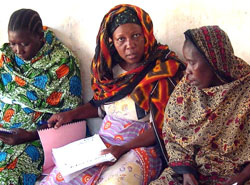You are here » Home » Telling Our Story
First Person
Seaweed farming brings one woman a world of benefits
A Bountiful Harvest from the Sea

| |
Photo: Frida Urio, ACDI/VOCA
|
|
Seaweed farming has opened my eyes to trying new income-generating activities in the village," said Mwanaisha.
|
To the casual observer, the Tanzanian coastline is a romantic paradise — graceful dhows silently glide along ancient trade routes, which once moved the treasures of mainland Africa to Zanzibar and beyond. But while the dhows still sail, the reality is a paradise lost. Since the mid-1990s, poverty has increased along with population, leading to the proliferation of unsustainable environmental and economic activities, and the destruction of the marine habitat. USAID is working with coastal communities to counter this trend by promoting agribusiness activities that drive sustainable growth and increase household incomes.
Mwanaisha Mgaza is a mother of four who lives in Mkwaja, a coastal village in Tanzania's northern Tanga region. Like many women in the area, Mwanaisha farms seaweed for additional income, but in a limited capacity. In 2002, Mwanaisha began to improve her seaweed business after joining a local farmers group and attending management courses offered by USAID. She hired extra help for labor-intensive activities and began to assume additional risks, knowing that her revenues would increase by a greater magnitude than her operating expenses, creating larger profits for her family.
Her efforts have been rewarded — and not just in income. While husbands and wives in the area do not traditionally work together in marine activities, Mwanaisha's husband joined her when saw how profitable seaweed farming could be. They now have nearly tripled the size of their farm, which, with only part-time work, nets them $80 a month — a high figure considering that Tanzania's per capita average income is less than $25 a month. Mwanaisha's farm also elevated her economic power in the household, and she now co-manages family finances with her husband. With their profits, she is educating her children, donating to community causes, and even contributing to a group savings club. She is also helping other women take up seaweed farming, propagating seed stock and giving seedlings to residents of other villages so they can try a few lines of seaweed. Her list of new recruits even includes her mother, who resides in a nearby village.
Said Mwanaisha, "Seaweed farming has opened my eyes to trying new income-generating activities in the village."
Print-friendly version of this page (244kb - PDF)
Click here for high-res photo
Back to Top ^ | 

